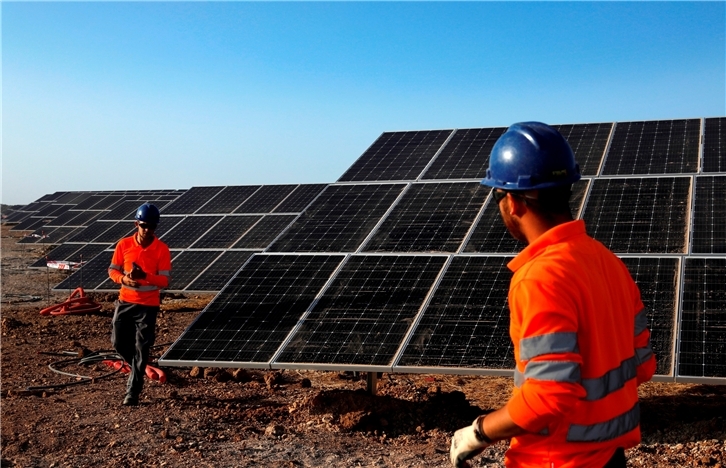News
-
21/08/2020Iberdrola’s largest wind farm comes into operation: East Anglia ONE, in UK waters Iberdrola, through its subsidiary ScottishPower Renewables, has put into operation what is now the largest wind farm in its history and one of the world's largest of its kind: the East Anglia ONE offshore wind farm in British waters in the North Sea. With an installed capacity of 714 megawatts (MW), the 102 turbines that comprise it are already operational, producing clean energy for 630,000 British homes. East Anglia ONE started up on schedule despite the complex environment generated by the Covid-19 pandemic. In fact, around 20% of the installation of the turbines was carried out during the lockdown period in the United Kingdom, which forced the company and its professionals to change their working methods: smaller boats were fitted out to reduce the crews as much as possible, spaces were created for professionals to live together to avoid contact with people outside the project and specific health protocols were developed, avoiding changes to the teams. East Anglia ONE is fully operational, after an investment of £2.5 billion and the generation of 3,500 jobs during its construction. These are in addition to the 100 permanent and skilled jobs generated for the operation and maintenance of the park at the Lowestoft base on the east coast of the United Kingdom, about 200 kilometres from London. Iberdrola is thus one step ahead towards the energy model of the future. The launch of East Anglia ONE reinforces Iberdrola's leadership in the development of offshore wind power, of which it has a portfolio of 12,000 MW worldwide, plus 9,000 MW of development options in Sweden. Spanish technology in the North Sea This new facility is a new example of green recovery as a driving force for the economy and employment, both locally and for Iberdrola's collaborating companies in other countries. Specifically, the Spanish company Navantia has manufactured the park's substation, which has been christened Andalucía II, at its facilities in Puerto Real (Cádiz). This large infrastructure is responsible for collecting the electricity produced by the wind turbines and transforming the voltage for its transmission to the coast, via two export cables on the seabed, each about 85 kilometres long. In addition, Navantia Fene, in Galicia, has built 42 jackets or foundations on which the wind turbines are supported, each more than 167 metres high, while the Asturian company Windar built the corresponding piles at its workshops in Avilés (Asturias). Iberdrola, through ScottishPower Renewables, has also made East Anglia one of the focal points of its training development strategy, involving 3,000 students from across the educational spectrum, with the launch of the subsidiary's first apprenticeship programme and the collaboration with ten engineering postgraduates at the University of East Anglia. Moving towards East Anglia HUB, the world's largest offshore wind complex Following the launch of the East Anglia ONE, Iberdrola now has its sights set on the East Anglia HUB, which is the group's largest marine project worldwide and comprises three projects with a total capacity of 3,100 MW: East Anglia ONE North, East Anglia TWO and East Anglia THREE. The development of this large complex, which is scheduled to start in 2022, will require an investment of £6.5 billion, more than €7.6 billion. The three farms will be developed simultaneously and will make Iberdrola one of the leading operators in the UK offshore wind sector. READ MORE
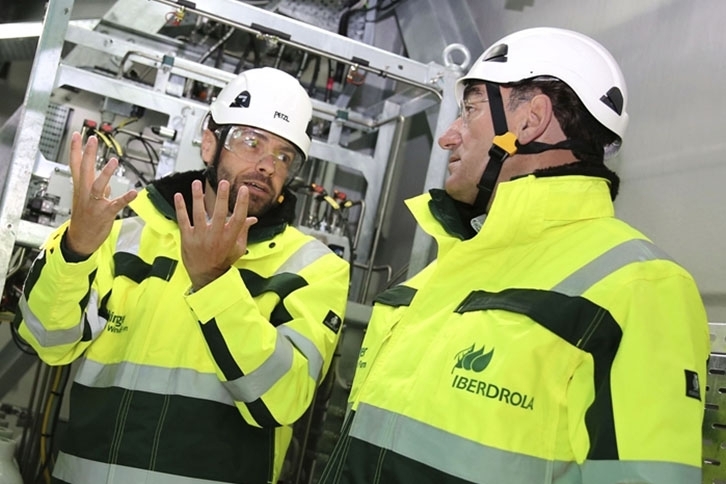
-
12/08/2020Iberdrola impulsa la transición energética en Grecia con el desarrollo de tres nuevos proyectos eólicos Iberdrola sigue impulsando la transición energética hacia un modelo descarbonizado en los países donde opera, concretamente en Grecia, donde acaba de adjudicarse la construcción de tres nuevos proyectos eólicos en la subasta de capacidad celebrada recientemente en Atenas. Las instalaciones suman una potencia conjunta de 98,1 MW, distribuida en los parques eólicos de Askio II (33,6 MW) y Askio III (48 MW), que se situarán en las unidades periféricas de Kozani y Kastoriá, ambas pertenecientes a la periferia de Macedonia Occidental; y Rokani (16,5 MW), que se ubicará cerca de la isla de Eubea (periferia de Grecia Central). Con estos nuevos desarrollos -que entrarán en operación en 2022, previsiblemente- la capacidad renovable de Iberdrola en Grecia se elevará a 415 MW. Además, el grupo opera en Chipre el parque eólico de Agia Anna, de 20 MW. La compañía apuesta una vez más por la inversión en el mercado de energía renovable griego, tras la vuelta al crecimiento impulsado por el compromiso del país y la Unión Europea con la descarbonización. En la actualidad, Grecia cuenta con 7.237 MW de capacidad renovable instalada, de ellos 3.832 MW son eólica. Iberdrola confía en que la electrificación actuará de palanca de cambio en el mundo postCOVID y, por ello, ha acelerado inversiones para contribuir a la reactivación de la actividad económica y el empleo. Esta apuesta por la recuperación en verde le ha llevado a comprometer inversiones récord este año de 10.000 millones de euros en energías renovables, redes eléctricas inteligentes y sistemas de almacenamiento a gran escala, después de haber destinado 100.000 millones desde 2001 en el mundo. Iberdrola es un grupo líder en energía renovables en el mundo, con una capacidad instalada de 32.700 MW, que convierten a su parque de generación en uno de los más limpios del sector energético. A junio, la cartera de proyectos renovables de la compañía supera los 58.000 MW. READ MORE
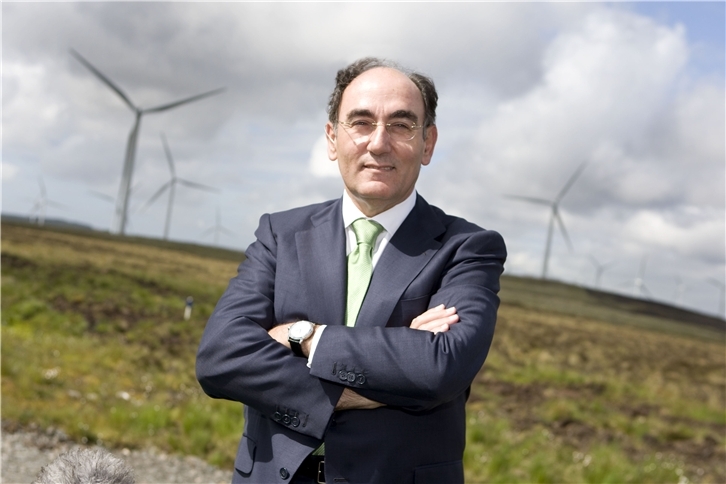
-
04/08/2020300 ventilators donated by Iberdrola have arrived in Spain to strengthen the response capacity to Covid-19 This morning, aircraft ABW9604 landed at Madrid-Barajas Airport with a total of 300 pieces of state-of-the-art breathing equipment donated by Iberdrola with the aim of helping to strengthen the response capacity of the health services to Covid-19. Once on land, volunteers from the company collaborated in the management of the shipment of the Aeonmed VG70 (Intrusive Oxygen Ventilator) model ventilators, which will be distributed to Health Departments in the Autonomous Communities for direct distribution to hospitals in the next few hours. This initiative forms part of the global action undertaken by the Iberdrola group during the coronavirus health crisis and completes the process of delivering essential supplies, taking advantage of its global supply capability, as well as other charitable initiatives carried out in recent months worth more than 30 million euros. Since the beginning of the pandemic, the group has acquired a total of 400 pieces of breathing equipment to be donated to the health authorities and hospitals - in addition to the 300 that have arrived in Spain, 50 have been donated to Brazil and another 50 previously distributed in Spain - as well as 4.6 million masks, 120,000 protective coveralls and 20,000 pairs of goggles; all managed through the suppliers Iturri, Wottoline, Amara and Viral Health. This time, the logistics were carried out by the DSV transport group. Pandemic Action Plan with more than 150 measures The donation of health and prevention supplies, in coordination with the authorities, has formed part of the Iberdrola group's global response to the coronavirus health crisis. The group activated a pandemic action plan with more than 150 measures to protect its workers and suppliers, ensure the supply of its essential service and meet the needs of the most vulnerable groups and customers. The actions the company carried out included strengthening the energy service in 350 hospitals and medical facilities during the state of alarm. Also, coinciding with the outbreak of coronavirus and in order to contribute to the recovery of the economy and employment, it decided to place advance orders to suppliers worth 7 billion euros in the first six months of the year and raise its investments this year to 10 billion euros. Iberdrola has become the first company to obtain global certification from AENOR for its Covid-19 protocol. This certificate endorses its actions to deal with the coronavirus pandemic, guaranteeing both the health and safety of people and the maintenance and quality of the energy supply. Over 2,000 volunteers against Covid-19 Since the state of alarm was declared, Iberdrola has mobilised more than 2,000 volunteers in charitable initiatives in Spain. In a campaign entitled ‘Volunteers against Covid’, these kind-hearted people have taken part from their homes in 36 projects driven by 21 social organisations, that have reached over 12,000 people in vulnerable situations. The initiatives promoted by Iberdrola included making face masks, producing face shields with 3D printers, organising virtual correspondence between volunteers and isolated elderly citizens in nursing homes, donating electronic devices for senior citizens in isolation in hospitals and nursing homes, providing telephone support for people with disabilities or mental health conditions, and telling stories to children and adults with intellectual disabilities. READ MORE
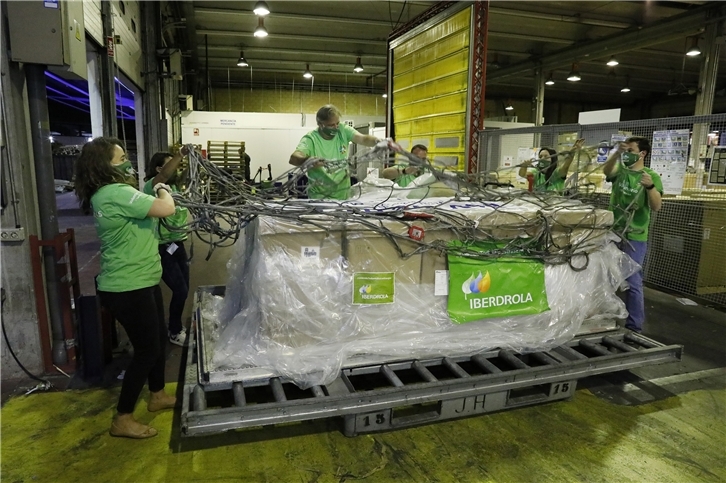
-
31/07/2020Iberdrola contributes to the economic development of Asturias with investments in renewables and support for industry, local employment and entrepreneurship Iberdrola has defined three areas of action related to energy transition as its contribution to the socio-economic development of Asturias: more investment in renewables, support for job creation by offering opportunities and contracts to local industry, and innovation projects, such as the creation of a Citizens’ Innovation Platform, to channel entrepreneurial initiatives. Last week the company announced the awarding of contracts to six Asturias-based companies (Windar, Tensa, Isotrón (Grupo Isastur), Gonvarri Solar Steel, Asturmadi Reneergy and Asturfeito) for new renewable energy projects and the deployment of smart electricity grids. These projects will enable companies from Asturias to take part in growth sectors in Spain and international markets and also create thousands of jobs in the region. These contracts and the agreement signed a month ago with Windar entail orders for close to 200 million euros, and amount to four times the company’s average annual purchases from suppliers in Asturias. In the last 18 months, the volume of contracts awarded by Iberdrola to local companies has increased and now totals 300 million euros. New investments in renewables will triple the region's installed capacity Iberdrola's commitment to establishing a forward-looking energy model in Asturias is complemented by the acceleration of investments in wind projects in the region. The company is developing four wind farms, with a total capacity of 130 MW, tripling its renewables-based installed capacity in the region. Investment in these projects amounts to more than 100 million euros and will create jobs for some 1,200 people, according to estimates from the PNIEC*. The four wind farms will be powered by SG114 wind turbines, each with a capacity of 2.62 MW: Cordel-Vidural (37 MW) is located between the municipalities of Navia, Valdés and Villayón; Capiechamartín (34 MW) is between Tineo and Valdés; Verdigueiro (36 MW) is situated between Tineo and Villayón, and Panondres (21 MW) between Villayón and Valdés. The construction of these projects is already helping to reactivate the local and national industrial fabric and employment in the region, since practically all the field and civil engineering work is being done by Asturias-based companies, such as Hormavasa, Horvalsa, Canteras Rencanos, Deymet, Excade, Posada, Méndez y Mota, Gruas Roxu and Taxus; the project is being developed by ERPASA and the wind turbines will be manufactured at Windar (Avilés) and at other Siemens Gamesa plants in Somozas (Galicia), Ágreda (Soria), Reinosa (Cantabria) and Lerma (Burgos). Citizens’ Innovation Platform to channel entrepreneurial initiatives Iberdrola's green recovery plan for Asturias includes the launch of a Citizens’ Innovation Platform to channel entrepreneurial initiatives, in particular those relating to the energy transition, which will serve to accelerate collaboration processes between the public, public bodies and companies. The main aim of this initiative is to transform the region into a space for advanced experimentation that will encourage entrepreneurs and start-ups to consider setting up in the region, by studying funding options for local suppliers’ R&D+i initiatives. The company will make available to the community a team of academics from the ALC-Euskampus of the University of the Basque Country and the Universidad Politécnica de Madrid who are part of EIT Climate-KIC, a knowledge and innovation network that is an offshoot of the European Institute of Innovation and Technology and is dedicated to accelerating the transition to a carbon-free economy. The initiatives in this field also include the promotion of training and awareness programmes aimed both at Dual Professional Training and institutes and universities in the area, with the aim of improving employability. Through a number of different schemes - agreements with local institutions, the ‘Iberdrola U’ youth enterprise programme, and training activities at the Iberdrola Campus in smart solutions related with electric mobility, self-generation and climate control - the company will promote the employability of young people and local professionals with the aim of turning them into active players in the energy transition. The circular economy and waste recovery The transformation of the region will include other projects, including one related to the circular economy, through the recovery of waste by recycling ashes, slag and gypsum for transformation into new materials for the construction sector. The actions will be complemented by greater investment in sustainable mobility, with the roll-out of a new charging infrastructure for electric vehicles, and the analysis of innovation projects related to new technologies, such as storage, green hydrogen production, etc. Also, the work of dismantling the Lada thermal power station over the next four and a half years will allow collaboration with local suppliers to continue. Their involvement in these associated tasks will represent a greater volume than at present. Backing clean, sustainable and competitive technology At the end of 2017, Iberdrola requested authorisation to close its last remaining thermal power stations in the world, located in Velilla (Palencia) and Lada (Asturias), following its decision to replace CO2 emitting facilities with the latest generation clean energy sources, thereby leading the energy transition towards a new sustainable energy model. The company hopes to be practically free of emissions in Europe by 2030 and has a target of achieving carbon neutrality by 2050 globally. Since 2001, Iberdrola has closed 17 coal and oil-fired thermal power stations around the world - the last two in Spain -, totalling more than 8,500 MW and making it the world’s biggest electricity producer with no coal-based production. This commitment to green recovery has led it to commit record investments this year of 10 billion euros in renewable energy sources, smart grids and large-scale storage systems, having earmarked 25 billion euros since 2001 in Spain (rising to 100 billion euros worldwide) which has allowed the creation of 80,000* jobs in Spain. Iberdrola is the leader in renewable energies in Spain, with an installed wind capacity of more than 6,000 MW and over 16,600 MW in renewables as a whole. Worldwide, the total amounts to 32,700 MW, making its generation facilities among the cleanest in the energy sector. *Assessment according to the PNIEC's estimates of between 12 and 14 jobs/yr created per €1m invested * PwC report “Iberdrola's Economic, Tax, Social and Environmental Impact on the World”. READ MORE
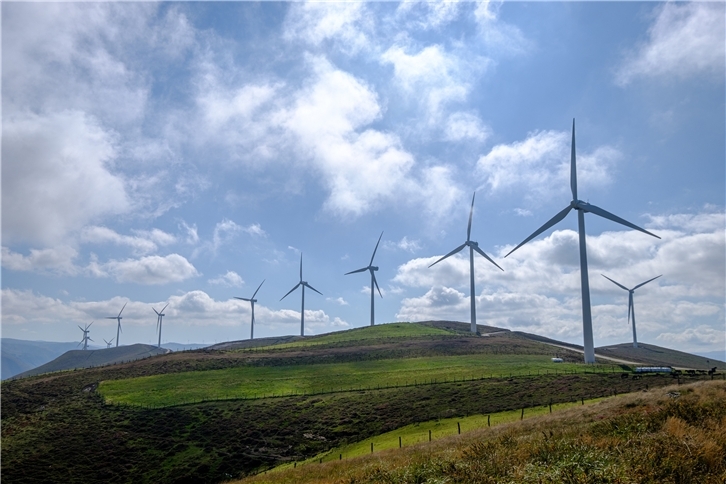
-
31/07/2020Iberdrola, ranked on the FTSE4Good index for the eleventh consecutive year For the eleventh consecutive year, Iberdrola has been included in the prestigious international index FTSE4Good, designed to facilitate investment into the most sustainable companies in the world, taking environmental, sustainability and governance (ESG) criteria as a reference. The company has succeeded in meeting the strict requirements imposed by the committee that decides who will be included in the index. This decision is based on an increasingly demanding methodology consisting of 203 indicators, which include environmental conservation, social commitment and corporate governance. Appearing in the FTSE4Good index reaffirms Iberdrola’s success with work standards, human rights, health and safety, biodiversity, climate change, water and customer responsibilities and social aspects of the supplier chain. The company also complied with the organisation’s corporate governance, risk management, anti-corruption mechanisms and tax transparency requirements. Iberdrola already exceeds 32,000 megawatts (MW) of installed renewable capacity worldwide and has a portfolio of clean energy projects totalling a further 58,000 MW. Convinced that the economic and employment recovery can only be green, the group has decided to increase its investments to 10 billion euros in 2020, of which the majority will go on renewable energies and grids. Iberdrola is the only power company in Europe to have been included in all 20 editions of the Dow Jones Sustainability Index (DJSI) , a clear sign of its strong commitment to sustainability and recognition of its strategy, which has responded successfully to the main economic, environmental and social challenges relating to the international energy policy. Added to this is the group’s presence in the main international sustainability index's, which include MSCI, Sustainalytics, ISS-oekom, Bloomberg GEI, Euronext Vieto Eiris índices, Global100, EcoVadis, etc. Contribution to the Sustainable Development Goals (SDGs) Iberdrola has incorporated the Sustainable Development Goals (SDGs) defined by the United Nations for the 2030 horizon into its business strategy and its sustainability policy, and it is a benchmark for its direct contribution to these global goals, particularly in its contributions in the field of energy and climate change. With the renewal of the FTSE4Good index, Iberdrola's commitment to this 2030 Agenda is once again demonstrated. The company focuses its efforts on the supply of affordable and clean energy (Goal 7) and on climate action (Goal 13) while also contributing directly to ensuring clean water and sanitation (Goal 6), increasing its investment in R&D+i activities (Goal 9), promoting respect for the life of terrestrial ecosystems (Goal 15) and working to establish partnerships to achieve the goals (Goal 17). Furthermore, Iberdrola has always shown its commitment to reducing emissions to combat climate change and moving towards the decarbonisation of the economy. The company has set the new environmental objective of achieving a 50% reduction in its CO2 emission intensity by 2030 over 2007 levels, and of being carbon neutral by 2050. READ MORE

-
29/07/2020Iberdrola will build and operate the world’s largest on site photovoltaic self-consumption system for SABIC Iberdrola and SABIC are making progress in their respective business and sustainability strategies with the signing of a pioneering long-term power purchase agreement (PPA) whereby the energy company will provide green electricity to the industrial plant of the petrochemical multinational in La Aljorra - Cartagena, in Murcia, for the next 25 years. Based on this agreement, Iberdrola will promote, construct and operate the world’s largest on site photovoltaic self-consumption system. With an investment of nearly 70 million euros, the new renewable facility, which will be developed on the site of SABIC's industrial plant, will have an installed capacity of 100 megawatts (MW) and will consist of 263,000 solar modules. The facility will increase the renewable capacity installed by Iberdrola in the Region of Murcia by almost 60% and up to 500 jobs will be generated during its construction, many of them local. The alliance reinforces the innovative approach of Iberdrola’s strategy to undertake renewables projects in Spain through bilateral agreements that promote the supply of power at competitive and stable prices to large customers who are committed to sustainable consumption. The commissioning of the solar plant will provide SABIC customers in markets including the automotive and construction sectors access to 100% renewable electricity produced polycarbonate solutions, in response to their demand for more sustainable products for a carbon-neutral world. “PPAs continue to place value on the competitiveness of renewables and continue to open up opportunities for the development of innovative projects that are transforming the present and future of energy in our country. The long-term energy purchase and sales contracts provide stability to investments and have also become an optimal tool for managing the electricity supply of large consumers who are committed to clean and sustainable consumption.”, explains Eduardo Insunza, Global Strategic Customers Director. Bob Maughon, SABIC's Executive Vice President, Sustainability, Technology and Innovation at SABIC, adds: “This pioneering agreement with Iberdrola is a significant step towards achieving our long-term sustainability and clean energy goals. Partnerships of this kind are the cornerstone of our business growth model. The photovoltaic solar power plant in Cartagena demonstrates that SABIC continues to drive the sustainability agenda in the chemical industry and that a large-scale transition is possible. He added, “In recent years, numerous advances in renewable energy technology have made deployment to this extent possible. Our commitment to technology and innovation means that we will always be the first to adopt and are in an optimal position to carry out this transformation immediately. The new photovoltaic plant will deliver an 80kt annual reduction in indirect CO2emissions, and reinforces our support for and contribution to wider climate change initiatives such as Europe 2030 and our alignment with the UN's Sustainable Development Goals, where we can have the greatest impact”. Renewables for a green recovery Iberdrola is a global reference point in the area of PPAs and has long-term power purchase agreements (PPAs) in markets that include Spain, the United Kingdom, the United States and Mexico, with wind and photovoltaic power projects with an installed capacity of over 2,500 MW. In Spain, the company has been a pioneer in promoting this type of agreement with companies from sectors such as banking, telecommunications, the brewery industry, distribution and sports brands. The company is confident that electrification will act as a lever for financial recovery and employment in the post-COVID landscape. To drive that recovery, it is considering investments of €10 billion this year to launch new projects, industrial activity throughout the value chain, and innovation in fields such as renewables, smart grids and large-scale storage systems. In Spain, Iberdrola is the leader in renewable energies, with an installed wind capacity of more than 6,000 MW and over 16,500 MW in renewables as a whole; totalling more than 32,000 MW worldwide and making its generation facilities among the cleanest in the energy sector. In the Region of Murcia, the company operates 178 MW of renewable energy which is mainly wind power. Further details: What is a PPA and what are the main benefits? SABIC's environmental commitment: sustainability and the circular economy SABIC's sustainability strategy is guided by materiality analysis to ensure that resources are targeted to the issues most important to its stakeholders and business success. Sustainability is central to SABIC's business because it helps us create materials that benefit the global economy responsibly, maximise their positive impact on customers and society, and inspire innovation, technology management and operational efficiency. SABIC is already working to address changing customer and consumer demands through its TRUCIRCLE™ portfolio and services. The TRUCIRCLE initiative covers the company's circular materials and technologies, including certified circular polymers from the chemical recycling of used plastic, certified renewable bio-based polymers and others. The initiative is seen as key for SABIC to drive a world-class circular business and having renewable energy at the source of production strongly contributes to its vision of the future. READ MORE
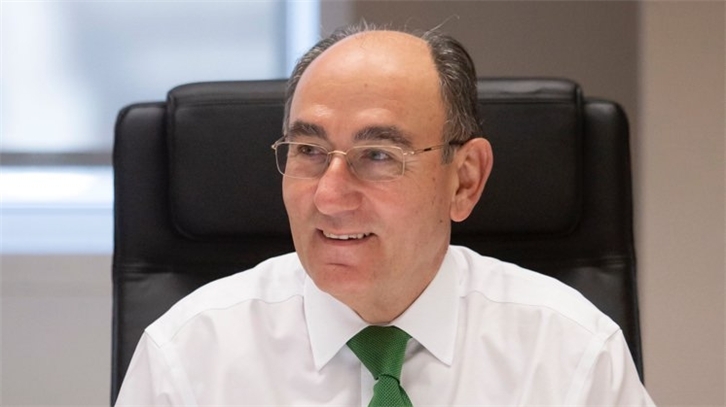
-
28/07/2020Iberdrola, SEAT and Volkswagen Group Spain Distribution join forces to boost electric mobility in Spain Iberdrola, SEAT and Volkswagen Group Spain Distribution (VGSD) reinforce their commitment to the electrification of transport with the signing of a strategic collaboration agreement to jointly promote the deployment of electric and sustainable mobility in Spain. The alliance has been supported in the meeting held between Iberdrola's President Ignacio Galán and the Volkswagen Group CEO and Chairman of SEAT's Board of Directors, Dr. Herbert Diess. The companies share the vision of the need to advance Spain's electrification in a coordinated manner, involving alliances between the main actors that are providing solutions in this field, as well as opportunities to set up an industrial, commercial and innovation ecosystem that allows our country to maintain a prominent position in the automotive industry of the future and lead the development of sustainable mobility in Europe. They have also identified the charging infrastructure as one of the key factors in boosting electromobility, and will therefore work together in its development in different areas of action. The green agreement includes the activation of cross-sectoral innovation projects and a plan to facilitate the deployment of fast and super-fast charging stations on the main corridors of the road network in Spain. In addition, they will encourage their use at SEAT facilities and in SEAT and Volkswagen Group Spain Distribution dealerships, as well as integration of Iberdrola's charging infrastructure in the navigators of electric vehicles and the selling of Iberdrola electric charging solutions at SEAT dealerships. In this context, Iberdrola has just completed the installation of 140 charging stations at SEAT centres in Martorell, including spaces for both private and public use. “The agreement shows the ambition of our transport electrification strategy and confirms the need for continued collaboration between all the actors to respond to the challenges of a mobility based on clean energy, without CO2 emissions, and the demands of a society committed to reducing pollution and increasing energy efficiency,” explained Ignacio Galán, chairman of Iberdrola, who also stressed “the role electrification will have in the green recovery, which will lead to economic recovery and job creation.” The CEO of the Volkswagen Group and Chairman of the Board of Directors of SEAT, Dr Herbert Diess, stated that “electric mobility is gaining ground, and demand for charging stations and clean electricity is on the rise. Now more than ever, there is a pressing need to establish an integral Europe-wide charging structure. Spain has a key role in this regard, and the Volkswagen Group wants to help to encourage electrical and emissions-free mobility in the Spanish market. Iberdrola is a strategic partner for us, particularly regarding the expansion of rapid charge points. Iberdrola is also advancing fast in terms of zero CO2 energy production and it now produces around 90% of its energy from renewable sources in Spain.” Diess summed up saying, “I am certain that by working together, Spanish roads will be electrified soon.” Sustainable dealers, innovation projects and green energy supply The automotive electrification strategy aims to use 100% renewable energy in the electric vehicle supply chain and to this end the companies will assess energy solutions to reduce CO2 emissions in the plants and dealerships of SEAT and Volkswagen Group Spain Distribution in Spain, with the analysis of proposals in the area of self-consumption, by installing solar panels, supplying 100% green energy and implementing energy efficiency solutions. The green alliance opens up other areas of collaboration, related to joint participation in pilot electromobility and R&D&I projects; the incorporation of electric vehicles by these manufacturers into Iberdrola's fleets and actions with SEAT and Volkswagen Group Spain Distribution sharing companies. Iberdrola speeds up electric mobility Iberdrola continues to push its stance for transport electrification as part of its strategy towards a decarbonised economy, as a key lever in the reduction of emissions and of city pollution, as well as for green recovery in the post-Covid world. In March, the company decided to step up its sustainable mobility plan by making additional investments - a total of 150 million euros - to provide even more electric vehicle charging stations. The initiative envisages the installation of nearly 150,000 electric vehicle charging stations over the next five years in homes and businesses and on the public road network. The roll-out will prioritise ultra-rapid (350 kW), super-rapid (150 kW) and rapid (50 kW) charging points on motorways and transit corridors. Electric vehicle drivers using Iberdrola stations can charge their electric vehicles with 100% green energy from clean generation sources with renewable Guarantee of Origin (GoO) certificates. The company also has the only App that incorporates verified information on operational electric vehicle charging stations in Spain, which in addition to geolocation for Iberdrola charging stations, allows reserving and paying from your mobile phone. The company has recently become the first Spanish business to subscribe to The Climate Group’s EV100 initiative, with the aim of accelerating the transition towards electric vehicles with a commitment to electrifying its entire fleet of vehicles and allowing its staff to charge their vehicles at its businesses in Spain and the United Kingdom by 2030. SEAT's electric future The automotive company is immersed in a transformation towards electrification of the company and its brands. In 2020 and 2021, SEAT and CUPRA will launch five new plug-in electric and hybrid models, which will be added to the electric version of the SEAT Mii that is already on the market. The León family will have plug-in hybrid models with the SEAT and CUPRA brands, manufactured in Martorell; the SEAT Tarraco will have a PHEV version and the CUPRA Formentor, the first model designed and developed for the CUPRA brand, will also have a plug-in electric hybrid variant. In addition, the future CUPRA Born will accompany the SEAT Mii electric as the company's second 100% electric vehicle. The company has also created SEATMÓ, a new brand focused on promoting sustainable mobility and offering also electric scooters and motorbikes. Up to 2025, SEAT will invest 5 billion euros in new research and development projects to electrify their range of vehicles, as well as equipment and facilities in its production plants. This new cross-sectoral alliance with Iberdrola is another step that shows the firm commitment of the automotive industry towards making the electric future a reality in Spain. Volkswagen Group Spain Distribution's commitment to sustainable mobility Volkswagen Group Spain Distribution has the mission to promote the transformation of mobility, and to do so in a way that is socially and environmentally sustainable. For this reason, it is committed to electromobility and its brands already include a wide range of 100% electric models such as the Volkswagen e-Up! and e-Golf, the Audi e-tron and the SKODA eCitigo, which will be joined in the next 18 months by a total of eight new electric models and four plug-in hybrids. Volkswagen Commercial Vehicles is the only company in the commercial vehicle industry that has electric versions for all segments of its range. READ MORE
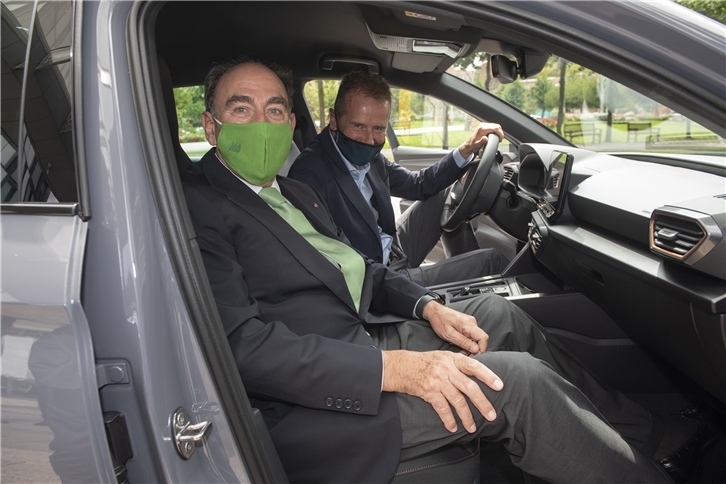
-
27/07/2020Iberdrola advances its plans in Extremadura: it has obtained environmental permits for another 300 MW Iberdrola is making progress on the most ambitious renewables investment plan in Extremadura and Spain, after obtaining the Environmental Impact Statement (EIS) for four photovoltaic plants in the province of Cáceres, with a total capacity of 300 MW: three of them are part of the Arañuelo Complex and amount to a total of 150 megawatts (MW) and the fourth, also located in the province of Cáceres, is the Arenales photovoltaic facility, with another 150 MW of installed capacity. Located in the Almaraz region, the Arañuelo I, II and III plants, with 50 MW each, will consist of 12,514 fixed structures and 366,180 solar panels. The project also includes an energy storage system involving the use of an innovative battery. The Arenales photovoltaic plant, with an installed capacity of 150 MW, will consist of 390,840 solar panels. The joint investment in these projects amounts to 180 million euros. More than 1,000 professionals will be involved in their construction during peak periods and there will be a large amount of local involvement, with the participation of companies such as Ecoenergias for the engineering and environmental work and Imedexa for the supply of high-voltage pylons. These four new projects are in addition to the two plants that Iberdrola will develop in the municipality of Cedillo - Majada Alta and San Antonio - with a joint installed capacity of 100 MW, for which it has already obtained the Environmental Impact Statement (EIS). The construction works for all these projects will be activated once the administrative authorisations and building permits are obtained. The construction of Ceclavín, under preparation The Ceclavín photovoltaic plant (328 MW) in Extremadura is in the final phase of the administrative process and Iberdrola is already preparing to start construction, which will involve 800 professionals. The project represents an investment of 250 million euros and, once in operation, will supply energy to a population equivalent of 175,385 homes/year and prevent the emission of 110,000 tCO2/year. In February, Iberdrola and Orange reached a long-term power purchase agreement (PPA) whereby the energy company will provide green energy to the 9,000 supply points in Orange's own network in Spain, for a period of 12 years. Half of this consumption, 200 GWh/year, will be made under the PPA (Power Purchase Agreement) formula, associated with this newly built renewable asset. Extremadura, at the heart of its renewable strategy Iberdrola has placed Extremadura the centre of its renewable strategy in Spain, where it will develop more than 1,800 MW of photovoltaic energy until 2022. Following the commissioning of Europe's largest photovoltaic plant, Núñez de Balboa , with 500 MW of installed capacity, on 6 April during the height of the coronavirus crisis, Iberdrola is constructing another seven renewable energy projects in the region in the coming months, with a total capacity of 728 MW. It also has the 590 MW Francisco Pizarro plant in the pipeline, located in Torrecillas de la Tiesa. Iberdrola is convinced that electrification will act as a lever for change in the post-Covid world, which is why the company has accelerated its investments to help reactivate economic activity and employment. This commitment to a green recovery has led it to commit record investments this year, worth €10bn, into renewable energy sources, smart grids and large-scale storage systems, having already allocated €100bn since 2001 throughout the world and of this, €25bn in Spain. Iberdrola is the leader in renewable energies in Spain, with an installed wind capacity of more than 6,000 MW and over 16,600 MW in renewables as a whole. Worldwide, the total amounts to 32,700 MW, making its generation facilities among the cleanest in the energy sector. READ MORE
